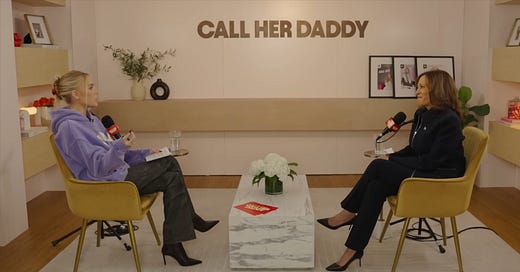The Podcast Era Is Horrible For Our Politics
The endless list of chummy late-night shows is perfect for politicians, and terrible for the public.
Politicians do not like answering questions. This makes sense: nobody particularly enjoys other people critiquing everything they do at work. Being accountable to the public is, in theory, the entire point of being a politician, which means that even the most powerful in this country must occasionally debase themselves by responding to direct queries. What they would rather do — almost always — is sit down for a nice conversation with someone who will generally let them say whatever they want and call it a day.
This format used to be (and still is!) the main function of late-night TV shows. Now, it’s podcasts.
Case in point: Kamala Harris’s current media strategy.
Here’s Politico’s summary of the mainstream media’s reaction to Harris’s latest interview, with the enormously popular podcast “Call Her Daddy.”
There were immediately takes from the mainstream political press about how the “Call Her Daddy” appearance, along with an upcoming interview later this week on Howard Stern’s radio show, were signs that Harris was shying away from substantive interviews and hiding from more combative reporters eager to press her on uncomfortable topics. And there were some snide suggestions about how going on “Call Her Daddy,” a show focused on relationships and sex, was a frivolous use of the VP’s time.
That sentiment — that Harris is “shying away from substantive interviews and hiding from more combative reporters” — is the entire point. It’s where we’ve gotten largely because of Big Podcast, and it sucks. What’s interesting to me, however, is how easy it is for people in power to spin it. From the same article:
“Harris has to make strategic decisions about every second of her time these last few weeks. You just can’t capture undecided voters by sticking with the traditional press. So by necessity, you have to spend time in other places,” said another Democratic strategist close to the campaign who was granted anonymity to speak about internal party thinking.
…
“More is more when it comes to getting the vice president out there in non traditional media outlets. No need to micro analyze every choice,” said Tim Miller, a former Republican communications staffer turned anti-Trump podcaster.
This is, for the most part, true! Going on these podcasts is great for campaigns — it allows them to speak directly to voters they otherwise wouldn’t have had access to, it humanizes and softens a candidate who is even the slightest bit media trained, it is all around a good strategic decision. But what frustrates me is that putting these responses up against the “critiques” of this strategy largely allows political operatives to pretend that the real point of all this — that aforementioned “shying away from substantive interviews” — is just more hot air, not a deliberate strategy enabled by an industry that has become almost entirely set up as a vehicle for public relations: Big Podcast.
Keep reading with a 7-day free trial
Subscribe to Discourse Blog to keep reading this post and get 7 days of free access to the full post archives.





